|
|
|
Sort Order |
|
|
|
Items / Page
|
|
|
|
|
|
|
| Srl | Item |
| 1 |
ID:
116743


|
|
|
|
|
| Publication |
2012.
|
| Summary/Abstract |
A dominant resistance factor against wind power projects seems to be their visual impact on the landscape. In addition stress effects from aircraft obstruction markings are an emerging topic related to acceptance. As the height of wind turbines increases, so does the number of mandatory obstruction markings. Recently, obstruction markings have caused a growing number of complaints from residents. Whether obstruction markings indeed cause stress or even substantial annoyance remains an open question. To analyse the stress impact of obstruction markings, we used environmental and stress psychology methodologies. Residents (N=420) with direct sight of turbines at 13 wind farms participated in a questionnaire survey. Evidence of substantial annoyance caused by obstruction markings was not found. However, residents exposed to xenon lights reported more intense and multifaceted stress responses than exposed to LED or colour markings on blades. Moreover, xenon lights negatively affected the general acceptance of wind energy. Additionally, synchronised navigation lights were found to be less annoying than non-synchronised lights under certain weather conditions. Markings with light intensity adjustment proved to be advantageous. To reduce stress and increase social acceptance of wind power, xenon lights should be abandoned, navigation lights synchronised, and light intensity adjustment applied.
|
|
|
|
|
|
|
|
|
|
|
|
|
|
|
|
| 2 |
ID:
180859
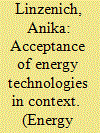

|
|
|
|
|
| Summary/Abstract |
In Carbon Capture and Utilization (CCU), CO2 captured from industrial processes replaces fossil feedstock used to produce of a variety of products, e.g., plastic products, fuels, or minerals. The roll-out of CCU will depend on the public's acceptance and risk perception. Whereas past studies exclusively focused on CCU risk perception, this study (n = 266) compared CCU to seven other infrastructure technologies (fossil, nuclear, renewable energies) to put the perceived CCU risks into perspective.
|
|
|
|
|
|
|
|
|
|
|
|
|
|
|
|
| 3 |
ID:
191170
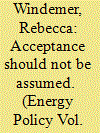

|
|
|
|
|
| Summary/Abstract |
Local community acceptance is a key influence on wind farm siting decisions. However, there is a temporal limitation to much social acceptance literature in that it does not consider how perceptions of the local community may change over the operational life of a wind farm and in the context of end-of-life applications for repowering or life-extension. In response, this paper increases the temporal depth of our understanding of social acceptance through presenting the results of survey research undertaken with communities living close to two English wind farms that have experienced end-of-life applications. For many respondents, perceptions of their local wind farm did not change following construction or over the life of the scheme, contrasting with common expectations that acceptance will increase over time. The findings reveal that community support for applications to repower or life-extend is influenced by experiences of living with the wind farm over time. It also shows how factors that have been found to impact perceptions of new wind farms, particularly the benefits that people experience, involvement in the planning process, and relationships with the developer, can influence responses to end-of-life applications. These insights are used to provide recommendations for end-of-life policy.
|
|
|
|
|
|
|
|
|
|
|
|
|
|
|
|
| 4 |
ID:
116985
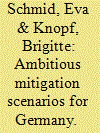

|
|
|
|
|
| Publication |
2012.
|
| Summary/Abstract |
This paper addresses the challenge of engaging civil society stakeholders in the development process of ambitious mitigation scenarios that are based on formal energy system modeling, allowing for the explicit attachment of normative considerations to technology-focused mitigation options. It presents the definition and model results for a set of mitigation scenarios for Germany that achieve 85% CO2 emission reduction in 2050 relative to 1990. During consecutive dialogues, civil society stakeholders from the transport and electricity sector framed the definition of boundary conditions for the energy-economy model REMIND-D and evaluated the scenarios with regard to plausibility and social acceptance implications. Even though the limited scope of this research impedes inferential conclusions on the German energy transition as a whole, it demonstrates that the technological solutions to the mitigation problem proposed by the model give rise to significant societal and political implications that deem at least as challenging as the mere engineering aspects of innovative technologies. These insights underline the importance of comprehending mitigation of energy-related CO2 emissions as a socio-technical transition embedded in a political context.
|
|
|
|
|
|
|
|
|
|
|
|
|
|
|
|
| 5 |
ID:
169730
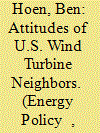

|
|
|
|
|
| Summary/Abstract |
Experts predict continuing deployment of wind turbines in the United States, which will create more interactions between turbines and surrounding communities. Policymakers can benefit from analyses of existing wind projects that enable them to better understand likely effects on residents around proposed projects. Our analysis of a randomly drawn, representative national survey of 1705 existing U.S. wind project neighbors provides previously unavailable detail about factors influencing the attitudes of these neighbors toward their local wind projects. Overall, we find positive-leaning attitudes, which improve over time as individuals self-select into communities near existing wind projects. Hearing wind turbines leads to less-positive attitudes, although living very near to turbines does not, nor does seeing wind turbines. In fact, our findings suggest complex relationships among nearby residents’ attitudes, their perceptions about the particular fit of turbines within their landscape and community, and their perceptions of wind project impacts on property values. These findings—along with the positive correlation between perceived planning-process fairness and attitude—suggest areas of focus for wind project development that may influence social outcomes and acceptance of wind energy. The concluding discussion provides a number of policy and future research recommendations based on the research.
|
|
|
|
|
|
|
|
|
|
|
|
|
|
|
|
| 6 |
ID:
149869


|
|
|
|
|
| Summary/Abstract |
Techno-economic assessments confirm the potential of wind energy to contribute to a low carbon bioeconomy. The increasing diffusion of wind energy, however, has turned wind energy acceptance into a significant barrier with respect to the deployment of wind turbines. This article assesses whether, and at what cost, Austrian renewable energy targets can be met under different expansion scenarios considering the socio-political and market acceptance of wind energy. Land-use scenarios have been defined in a participatory modeling approach with stakeholders from various interest groups. We calculated the levelized cost of electricity (LCOE) for all of the potential wind turbine sites, which we used to generate wind energy supply curves. The results show that wind energy production could be expanded to 20% of the final end energy demand in three out of four scenarios. However, more restrictive criteria increase LCOE by up to 20%. In contrast to common views that see local opposition against wind projects as the main barrier for wind power expansion, our participatory modeling approach indicates that even on the level of key stakeholders, the future possible contribution of wind energy to Austrian renewable energy targets reaches from almost no further expansion to very high shares of wind energy.
|
|
|
|
|
|
|
|
|
|
|
|
|
|
|
|
| 7 |
ID:
115692


|
|
|
|
|
| Publication |
2012.
|
| Summary/Abstract |
Carbon Capture and Storage (CCS) is an emerging technology to mitigate greenhouse gas emissions from fossil fuel-fired power plants. In the wake of a rapidly changing German energy system, CCS can play an important role. By means of an online survey among 130 university students in Dresden, this paper investigates the level and influencing factors of social acceptance of CCS. Furthermore, the individual willingness to pay for CCS and renewable power delivery is measured and compared through a choice model. The survey results reveal that the attitude towards CCS is neutral. Moreover, it is shown that acceptance of CCS is an important factor for the willingness to pay. The level of willingness to pay for CCS technology is much lower than for renewable energy.
|
|
|
|
|
|
|
|
|
|
|
|
|
|
|
|
| 8 |
ID:
162337
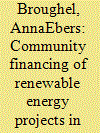

|
|
|
|
|
| Summary/Abstract |
Small-scale investors are gaining recognition as a valuable source of private funding necessary for a successful energy transition. Still, there is limited knowledge about the characteristics of potential investors, especially in community renewable energy projects. This study intends to address this gap and investigates the impact of socio-demographic and socio-psychological characteristics on individuals’ willingness to invest in community renewable energy projects. Our investigation is based on two large-scale representative surveys of 2260 respondents in Austria and Switzerland. The majority of respondents would be willing to invest 1000 to 10,000 CHF/EUR in such a project, with higher amounts in the Swiss sample. Potential investors in Austria tend to be male homeowners with higher incomes, while Swiss investors are more educated. Generally, positive attitudes and beliefs related to renewable energy have a significant impact on investment intention. The largest group of potential investors in both countries can be described as ‘urban wind energy enthusiasts’, who show high acceptance of wind energy installations near their communities. Surprisingly, a significant segment of potential investors is skeptical of a nearby wind installation. Study results can be used by decision-makers to tailor appropriate policy measures and by project developers for communication of the project aims and benefits.
|
|
|
|
|
|
|
|
|
|
|
|
|
|
|
|
| 9 |
ID:
162342
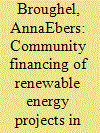

|
|
|
|
|
| Summary/Abstract |
Small-scale investors are gaining recognition as a valuable source of private funding necessary for a successful energy transition. Still, there is limited knowledge about the characteristics of potential investors, especially in community renewable energy projects. This study intends to address this gap and investigates the impact of socio-demographic and socio-psychological characteristics on individuals’ willingness to invest in community renewable energy projects. Our investigation is based on two large-scale representative surveys of 2260 respondents in Austria and Switzerland. The majority of respondents would be willing to invest 1000 to 10,000 CHF/EUR in such a project, with higher amounts in the Swiss sample. Potential investors in Austria tend to be male homeowners with higher incomes, while Swiss investors are more educated. Generally, positive attitudes and beliefs related to renewable energy have a significant impact on investment intention. The largest group of potential investors in both countries can be described as ‘urban wind energy enthusiasts’, who show high acceptance of wind energy installations near their communities. Surprisingly, a significant segment of potential investors is skeptical of a nearby wind installation. Study results can be used by decision-makers to tailor appropriate policy measures and by project developers for communication of the project aims and benefits.
|
|
|
|
|
|
|
|
|
|
|
|
|
|
|
|
| 10 |
ID:
166986
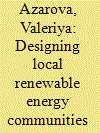

|
|
|
|
|
| Summary/Abstract |
Resistance of the local population to new energy infrastructure may hinder achieving the European Union's goal that 32% of energy consumption come from renewable sources. A vast literature is available on the social acceptance of specific renewable energy technologies, but existing research lacks assessments regarding comprehensive transformations to local energy systems. Moreover, the promising energy storage technology power-to-gas has not yet been addressed in acceptance studies. This paper fills these gaps by analysing data from a choice experiment survey with 2000 respondents across four nations (Germany, Austria, Italy, and Switzerland). Results from the analysis show that solar farms and power-to-gas infrastructure increase acceptance of local energy communities, while wind farms have an ambiguous effect, and gas power plants and power lines decrease acceptance. The derived monthly willingness to pay estimates for the acceptance-increasing technologies ranges from 8.5€ for power-to-gas to 29.5€ for photovoltaics. Additionally, we investigate whether stated support from political opinion leaders at the local, national, and EU levels can increase the acceptance of renewable energy systems. Results suggest that Italian choices are influenced by the opinions of EU and national governmental bodies (+3.5% and +2.7%), and that Swiss choices are sensitive to the opinions of local politicians (+2.3%).
|
|
|
|
|
|
|
|
|
|
|
|
|
|
|
|
| 11 |
ID:
166709
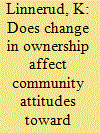

|
|
|
|
|
| Summary/Abstract |
The distributed nature of many renewable energy technologies allows for new ownership models as well as frequent ownership changes. We analyse whether a change in ownership negatively affects community attitudes toward a hypothetical small-scale hydropower plant. We use a two-stage framing experiment and a student sample. We find that a change in ownership has a significant negative effect on their attitudes toward the project, irrespective of whether the change is from a national to a local owner or vice versa. We interpret this finding as an example of a status quo bias, that is, a preference for the current state of affairs. A status quo bias makes renewable energy transitions more challenging, at least initially. Over time, as the status quo shifts, this may become less of an issue. We conclude the paper by discussing the robustness of our findings as well as whether and how policymakers can reduce the impact of such cognitive biases.
|
|
|
|
|
|
|
|
|
|
|
|
|
|
|
|
| 12 |
ID:
149879
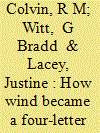

|
|
|
|
|
| Summary/Abstract |
Wind is recognised as a key source of renewable energy. Despite broad public support for the sector, wind energy proposals have routinely triggered social conflict and localised opposition. To promote social acceptance and avoid conflict, the wind energy sector undertakes community engagement. This paper interrogates the community engagement undertaken in King Island (Tasmania, Australia) for a large scale wind energy development proposal which did not proceed to implementation due to external economic factors. Despite the proponent's adoption of what was described as a ‘best practice’ community engagement strategy, the proposal caused significant social conflict for the community. In-depth interviews (n=30) were conducted with members of the King Island community and were qualitatively analysed through the social identity lens. Five key drivers of the local conflict were identified: problematic pre-feasibility engagement; the lack of a third-party facilitator of the community consultative committee; holding a vote which polarised the community; the lack of a clear place in the engagement process for local opposition, and; the significance of local context. These findings are instructive for improving community engagement practice for wind energy and other energy generation and land use change sectors.
|
|
|
|
|
|
|
|
|
|
|
|
|
|
|
|
| 13 |
ID:
166973
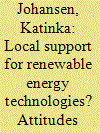

|
|
|
|
|
| Summary/Abstract |
This paper documents different attitudes towards local renewable energy technology (RET) projects in Denmark among two key RET stakeholder groups, permanent area residents (PRs) and second home owners (SHOs). It does so via survey data collected from almost 2000 respondents during a Danish near-shore wind farm tender. Judging by this data, local PRs are positive towards the planned local RETs, while SHOs are less so. This emphasizes that potential RET project stakeholders and stakeholder groups may have very different RET project perceptions and opinions. The planned RET projects were subject to widespread critique in the public and political RET project related debate, but the documented PR RET project support was rather silent support. This is a noteworthy inconsistency calling for further research. Drawing upon research insights from the interdisciplinary socially focused energy transitions body of literature, the paper suggests that particular uses of and attachments to particular places may inform stakeholder perceptions of RET related local change. The research findings have significant implications for RET planning, practice and policy more broadly.
|
|
|
|
|
|
|
|
|
|
|
|
|
|
|
|
| 14 |
ID:
162305
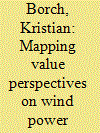

|
|
|
|
|
| Summary/Abstract |
Social acceptance of wind power is a complex matter, and national public interest does not necessarily translate into local public interest. If community concerns is disregarded in public spatial planning and the private development of wind power projects, the expected increase in the production of wind power energy will be jeopardized. Value propositions for installing wind farms in a community often consider only national policy targets, end users and those organizations that make a profit on installing, running or owning a wind turbine power plant. In many cases, the impact of technologies on society is underestimated, especially the impact on those actors who are influenced by technological change but without perceived benefit. This paper applies a value framework to systematically analyse the perceived value of the National Test Centre for Large Wind Turbines in Denmark, considering different stakeholder dimensions of acceptance (socio-political, market and community) from four perspectives (economic, psychological, sociological and environmental) before arriving at some policy recommendations on how to incorporate community values when siting wind turbines.
|
|
|
|
|
|
|
|
|
|
|
|
|
|
|
|
| 15 |
ID:
171488
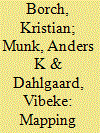

|
|
|
|
|
| Summary/Abstract |
Social media is a powerful communication tool through its universality and ease of access, which potentially has a huge impact on implementation of wind power. This study investigate a large corpus of Danish Facebook pages advocating anti-wind power viewpoints, distinguishing between localisation, different user groups, subjects and activity types. In doing this the following questions are answered: How localised are wind protests on Facebook?; To what extent can we perform a qualitative discourse analysis on different groups of Facebook users?; What can be said about the differences between community and cross-cutting Facebook users?; How are the voiced concerns articulated?; How are concerns managed by Facebook users?
|
|
|
|
|
|
|
|
|
|
|
|
|
|
|
|
| 16 |
ID:
190641
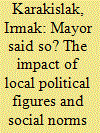

|
|
|
|
|
| Summary/Abstract |
Wind energy plays an important role in the energy transition. However, many wind energy projects result in conflicts at the local level. Mayors and local council members are key actors who can play a supportive, moderating, escalating, or mediating role in siting decisions about wind energy. Further, communities' social norms encapsulate their beliefs about what a wind energy project should be like. Alongside public expectations, these norms indicate the layers of cultural dynamics and standards of communities. Hence, this study investigates the dynamics of local responses to wind energy projects and their outcomes. This is achieved through an empirical-qualitative approach in which the experiences of four Bavarian case studies in Germany are illustrated using document analysis and in-depth interviews. The results of this study indicate that mayors play a crucial role in local responses to wind energy projects in Bavaria. Their support is necessary but not sufficient for local acceptance. Other stakeholders, next to project characteristics and communication, as well as external events, also have an impact on local responses over time. The paper concludes with lessons learned about communication and information strategies, as the study has implications for policymakers and practitioners in relation to designing and planning wind energy projects.
|
|
|
|
|
|
|
|
|
|
|
|
|
|
|
|
| 17 |
ID:
193739
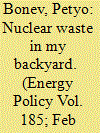

|
|
|
|
|
| Summary/Abstract |
We evaluate a political market mechanism for siting nuclear waste repositories to local communities. This mechanism consists of a local referendum and economic incentives offered to the local population. Using a randomized choice experiment, we find that the political market mechanism decreases the Not-In-My-Backyard opposition in the case of nuclear waste.
|
|
|
|
|
|
|
|
|
|
|
|
|
|
|
|
| 18 |
ID:
192718
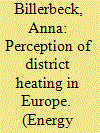

|
|
|
|
|
| Summary/Abstract |
To increase the deployment of district heating in line with European targets, there is a need to understand consumer perceptions and the role of regulations. Therefore, this paper focuses on consumer perceptions of district heating and analyses the influencing factors. The analysis uses data from an online survey with 4388 participants from nine European countries. In particular, the paper discusses the impact of socio-demographic factors, attitudes and regulations on the perception of district heating. Statistical analyses show that respondents from Denmark and Sweden have the most positive perception, while respondents from Lithuania and the Netherlands have a less positive perception of district heating. In addition, the results indicate that respondents from countries with no mandatory connection, liberalised price regulation and mainly public ownership seem to have a more positive perception of district heating, higher satisfaction when using district heating and a more positive rating of their heating price than those from countries with mandatory connection, regulated prices and a more mixed ownership structure. Overall, the paper provides a first overview of possible factors influencing the perception of district heating and indicates that the mix of appropriate regulations and, in particular, their combined impact, could play an important role in perception.
|
|
|
|
|
|
|
|
|
|
|
|
|
|
|
|
| 19 |
ID:
096714


|
|
|
|
|
| Publication |
2010.
|
| Summary/Abstract |
The public acceptance of biofuels in Greece is examined in this work. The analysis of 571 face to face interviews shows that 90.7% of the respondents believe that climatic changes are related to fossil fuel consumption, while only 23.8% know the difference between biodiesel and bioethanol. 76.1% believe that energy saving should precede the use of an alternative source of energy. Only 27.3% believe that priority must be given to biofuels over other renewable energy sources. Only 49.9% think that the use of biofuels can be an effective solution against climatic changes and 53.9% believe that the use of biofuels can be an effective solution for the energy problem. Finally, 80.9% of the car owners are willing to use biofuels, 44.8% are willing to pay the supplementary amount of 0.06 €/L of the fuel market price, while the average amount reported as willing to pay was 0.079 €/L on top of the fuel market price. Furthermore, eight models correlating the eight main responses with several socioeconomic variables are developed and analyzed. Those findings heave important policy implications related to the use and promotion of biofuels.
|
|
|
|
|
|
|
|
|
|
|
|
|
|
|
|
| 20 |
ID:
097507


|
|
|
|
|
| Publication |
2010.
|
| Summary/Abstract |
The public acceptance of biofuels in Greece is examined in this work. The analysis of 571 face to face interviews shows that 90.7% of the respondents believe that climatic changes are related to fossil fuel consumption, while only 23.8% know the difference between biodiesel and bioethanol. 76.1% believe that energy saving should precede the use of an alternative source of energy. Only 27.3% believe that priority must be given to biofuels over other renewable energy sources. Only 49.9% think that the use of biofuels can be an effective solution against climatic changes and 53.9% believe that the use of biofuels can be an effective solution for the energy problem. Finally, 80.9% of the car owners are willing to use biofuels, 44.8% are willing to pay the supplementary amount of 0.06 €/L of the fuel market price, while the average amount reported as willing to pay was 0.079 €/L on top of the fuel market price. Furthermore, eight models correlating the eight main responses with several socioeconomic variables are developed and analyzed. Those findings heave important policy implications related to the use and promotion of biofuels.
|
|
|
|
|
|
|
|
|
|
|
|
|
|
|
|
|
|
|
|
|